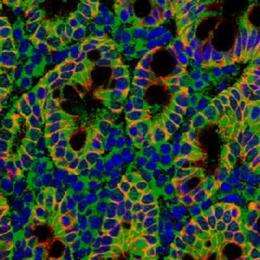Invisible helpers: How probiotic bacteria protect against inflammatory bowel diseases

Yoghurt has been valued for centuries for its health-promoting effects. These effects are thought to be mediated by the lactic acid bacteria typically contained in yoghurt. Evidence from recent scientific studies show that some bacterial strains actually have a probiotic effect and can thus prevent disease. A team of biologists and nutrition scientists working with Prof. Dirk Haller from the Technische Universitaet Muenchen (TUM) has now discovered the mechanisms at work behind this protective effect (Cell Host & Microbe).
In experiments with mice, the scientists observed that lactocepin – an enzyme produced from the lactic acid bacterium Lactobacillus paracasei – can selectively interrupt inflammatory processes. As the scientists observed, lactocepin degrades messengers from the immune system, known as chemokines, in the diseased tissue. As a part of the "normal" immune response, chemokines are needed to guide defense cells to the source of the infection. In chronic intestinal disorders like Crohn's disease and ulcerative colitis, the otherwise highly effective defense mechanism against infectious agents is malfunctioning. Chemokines such as "IP-10" then contribute to the tissue damage due to chronic inflammatory processes, preventing the tissue from healing.
"Lactocepin is a familiar element in food technology research," says Prof. Dirk Haller, who holds the Chair for Biofunctionality of Food at the TUM. "What is surprising, however, is its biomedical effect, namely the force with which the enzyme attacks and degrades very specific inflammatory mediators." Haller is certain that, based on this mechanism, it will be possible to develop new approaches to the targeted prevention and treatment of chronic bowel diseases as well as skin disorders: "The anti-inflammatory effect of lactocepin is limited to specific areas and up to now it has no known side effects."
The scientist therefore plans to carry out clinical studies in order to test the possible pharmaceutical application of the enzyme. Questions also remain to be answered in relation to the "production" of lactocepin by lactic acid bacteria. Some bacterial strains, such as Lactobacillus paracasei, produce highly potent lactocepins; however, the effectiveness of other microorganisms has not yet been proven. Dirk Haller therefore warns against false promises: "Not every product labeled as 'probiotic' actually earns this name."
More information: M.-A. von Schillde, G. Hörmannsperger, M. Weiher, C.-A. Alpert, H. Hahne, C. Bäuerl, K. van Huynegem, L. Steidler, T. Hrncir, G. Pérez-Martínez, B. Kuster, D. Haller (2012): Lactocepin Secreted By Lactobacillus Exerts Anti-Inflammatory Effects By Selectively Degrading Proinflammatory Chemokines, Cell Host & Microbe, doi: 10.1016/j.chom.2012.02.006














